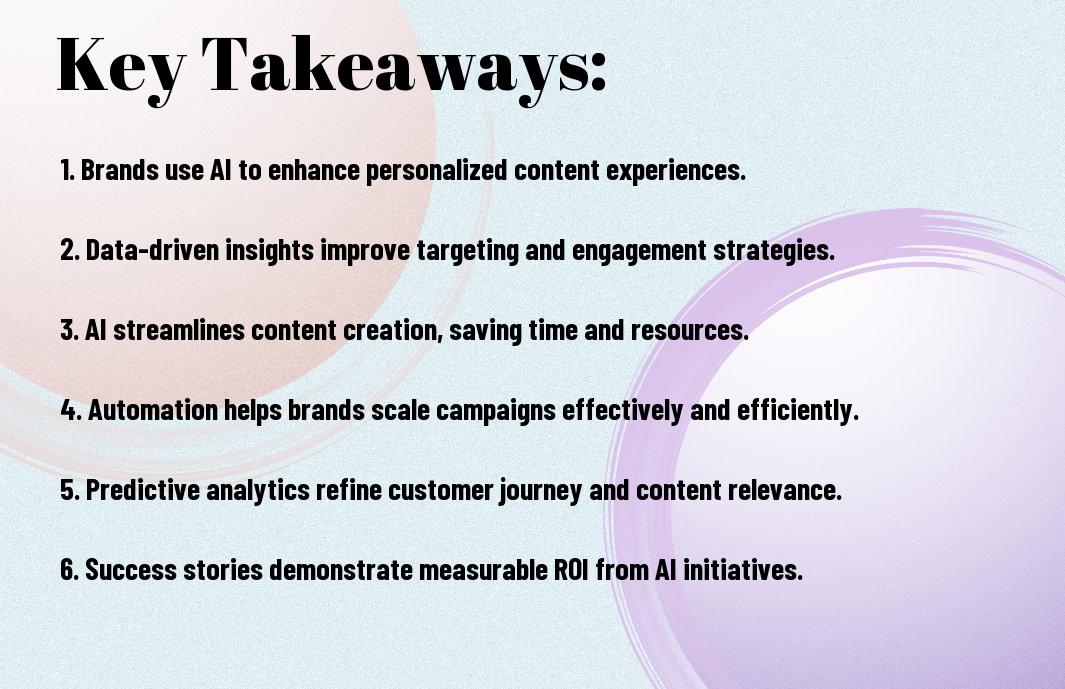
You have the opportunity to explore how leading brands are transforming their content marketing strategies through the power of AI. These success stories highlight the practical applications of artificial intelligence that can enhance your brand’s audience engagement and drive conversions. From personalization to automation, these case studies showcase the innovative ways companies are using AI to solve common challenges in content creation and distribution. For deeper insights, check out these 4 Incredible AI Case Studies in Content Marketing that could inspire your own strategies.
Key Takeaways:
- Personalization: Brands utilizing AI have significantly improved user experience by delivering highly personalized content based on customer preferences and behaviors.
- Efficiency: Automation of content creation and distribution processes allows companies to produce content rapidly, enhancing overall operational efficiency.
- Data Insights: AI tools enable brands to analyze vast amounts of data, providing valuable insights into customer trends and content performance.
- Enhanced Engagement: AI-driven content strategies lead to higher engagement rates, as brands can create tailored messages that resonate with their audiences.
- Predictive Analytics: Leveraging AI for predictive analytics helps brands anticipate future customer needs and adjust their content strategies accordingly.
- Visual Content Generation: Some companies have successfully employed AI to create engaging visual content, further enriching their marketing campaigns.
- Cost-Effectiveness: By streamlining content processes and improving targeting, AI implementation often results in reduced marketing costs for businesses.
Understanding AI in Content Marketing
While content marketing continues to evolve, the integration of artificial intelligence (AI) brings a transformative edge to the way brands engage with their audiences. AI in content marketing refers to the use of intelligent algorithms and machine learning techniques to produce, distribute, and personalize content for consumers. By leveraging AI, brands can analyze consumer behaviors, predict trends, and tailor their messaging to meet the specific needs of their target demographics, resulting in a more engaging and relevant experience.
Definition of AI in Content Marketing
Against this backdrop, AI in content marketing encompasses a range of technologies that enhance various aspects of the content lifecycle. From automated content creation to advanced analytics that inform strategy, AI allows marketers to utilize data in real time, ensuring that their content remains compelling and effective. This technology streamlines processes, delivering content that resonates with your audience on a personal level.
As AI tools continue to develop, brands are given new opportunities to optimize their marketing efforts. For instance, AI can help you segment your audience based on behavior and preferences, ensuring that the right content reaches the right people at the right time. This results in greater engagement and improved ROI, as your content efforts are directed more effectively.
Importance of AI in Today’s Digital Landscape
On the other hand, the significance of AI in today’s digital landscape cannot be understated. As competition intensifies across various platforms, brands must leverage innovative tools to capture and retain consumer attention. AI equips you with the insights needed to make data-driven decisions, enhancing your marketing strategies in real-time. This agility not only promotes personalization but also allows you to respond to changing market dynamics swiftly.
Plus, employing AI in content marketing enables you to optimize your campaigns with greater accuracy. By analyzing large data sets, AI technologies can uncover patterns and trends that human analysts may overlook. This advanced level of insight means you can create content that precisely aligns with your audience’s current interests, potentially boosting conversion rates and customer satisfaction significantly.
Key AI Technologies Used in Content Marketing
Behind the scenes, several key AI technologies are shaping the future of content marketing. Natural Language Processing (NLP), for example, allows for the generation of human-like text which can be utilized for blogs, articles, and social media posts. Additionally, machine learning algorithms help in audience segmentation and predictive analytics, offering tailored recommendations based on user behavior. These technologies empower you to personalize content at scale, ensuring that each interaction is meaningful to your audience.
Marketing automation platforms are also heavily reliant on AI capabilities. They simplify the process of managing campaigns, tracking results, and adjusting strategies as necessary. Access to real-time analytics ensures that you can pivot quickly if required, maintaining relevance amidst the fast-paced nature of digital marketing. Overall, the fusion of these technologies not only elevates your content marketing efforts but also positions your brand ahead of the curve.


Success Stories of Brands Leveraging AI
Some brands have successfully harnessed the power of AI to transform their content marketing strategies, resulting in not only better engagement but also enhanced customer satisfaction. Below are a few notable case studies that exemplify how leveraging AI can yield substantial benefits.
Case Study 1: Coca-Cola
Among the many innovative strategies Coca-Cola has employed, their use of AI in content marketing stands out. The brand capitalized on data analytics to predict consumer preferences and tailor its marketing campaigns accordingly. By analyzing customers’ interactions on social media platforms, Coca-Cola learned what flavors, colors, and themes resonated most with their audience. This informed decisions on new product launches and promotional content, leading to more targeted and impactful messaging.
Furthermore, Coca-Cola utilized AI tools for creating personalized content, ensuring that their advertisements were not just widely broadcast but genuinely appealing to individual consumers. They achieved this through programmatic advertising, which allowed them to modify their messages in real time based on user engagement and feedback, further solidifying their connection with customers.
Case Study 2: Nike
On the frontier of AI integration, Nike has also made remarkable strides in content marketing. Their approach combines data analytics with creative storytelling, producing campaigns that resonate deeply with their target audience. Using AI-driven insights, Nike crafts tailored messages that speak directly to consumer preferences and behaviors. This technique has helped them stay relevant in a competitive market, attracting customers who value personalized experiences.
Nike’s marketing strategies include leveraging AI for social media listening, allowing them to analyze consumer sentiment surrounding their products. This intelligence guides their campaign development and aligns their branding efforts with real-time consumer interests, taking customer engagement to the next level.
Nike’s commitment to data-driven storytelling has allowed them not only to optimize their content marketing but also to build a community around their brand, turning customers into loyal advocates.
Case Study 3: Starbucks
Brands like Starbucks have utilized AI to enhance their customer interactions significantly. By implementing machine learning algorithms, Starbucks has been able to predict what products customers are likely to buy based on their previous purchases and preferences. This data-driven approach allows the company to personalize marketing communications effectively, thereby increasing customer loyalty and driving sales.
Moreover, Starbucks employs AI in its mobile app to recommend drinks to users, providing personalized offers and further engaging them in the brand’s experience. This level of customization not only improves customer satisfaction but also boosts the effectiveness of their marketing initiatives.
Another aspect of Starbucks’ implementation of AI is their investment in chatbots to facilitate customer interactions. This not only streamlines service but also gathers invaluable data on customer preferences and trends.
Case Study 4: Unilever
Below the surface of Unilever’s extensive brand portfolio lies a sophisticated use of AI to drive content marketing strategies. The company conducts comprehensive data analysis to understand market trends and consumer behavior. This approach allows Unilever to craft highly insightful and engaging content that resonates with different audience segments. By identifying gaps in the market, they can tailor their products and marketing efforts to meet emerging needs.
Additionally, Unilever utilizes AI for optimizing their advertising, using tools that analyze ad performance in real time. This enables them to adapt their campaigns dynamically, ensuring maximum visibility and engagement with consumers.
Personalized marketing is at the heart of Unilever’s strategy, as they develop content and offers that reflect an understanding of local nuances and individual preferences. This dedication to personalization significantly enhances customer experiences and solidifies brand loyalty.

AI Tools and Platforms for Content Marketing
For marketing professionals navigating the rapid advancements in technology, leveraging AI tools can significantly enhance content marketing strategies. These tools are designed to optimize various aspects of content creation, distribution, and analysis, enabling brands to engage their audiences more effectively. As brands strive to stand out in a crowded market, these AI-driven resources can provide the edge needed to succeed.
Overview of Leading AI Tools
Before entering into the specifics, it’s vital to recognize some of the leading AI tools available today. Platforms like Jarvis (now known as Jasper), Copy.ai, and Frase are at the forefront, helping you to generate high-quality content quickly and efficiently. These tools harness natural language processing (NLP) and machine learning capabilities to understand audience preferences and create tailored content that resonates with users.
Features and Benefits of Each Tool
One of the standout features of tools like Jasper is their ability to generate a variety of content formats, from blog posts to social media updates, providing you with versatility in your content marketing efforts. Copy.ai offers templates specifically designed for different content needs, enabling you to save time while maintaining quality. In addition, Frase emphasizes optimization, helping you to align your content with SEO best practices, thus improving your online visibility and search rankings.
Indeed, each tool comes with its own unique advantages that cater to different aspects of content marketing. Some tools offer integrated analytics to measure engagement and effectiveness, while others focus on collaboration features that allow your team to work seamlessly together. The variety ensures that you can find a solution that aligns with your specific objectives and operational requirements.
Selecting the Right AI Tool for Your Brand
Tools can also vary significantly in terms of pricing, functionality, and user interface. Consider your team’s technical expertise and your content goals when selecting a tool. For example, if you are a small business owner, a cost-effective tool with straightforward features may be more beneficial than a high-priced option with complex capabilities. Assessing these factors will help you to choose a tool that not only fits your budget but also supports your content marketing needs.
For instance, if your focus is on creating engaging social media content, a tool with strong automation and scheduling features might be ideal. On the other hand, if your primary goal is search engine ranking, investing in a tool with optimization capabilities is vital. Taking the time to evaluate your brand’s specific needs against what each tool offers will lead to a more effective content marketing strategy.
The Role of Data in AI-Driven Content Marketing
To effectively harness the potential of AI in content marketing, businesses must recognize the importance of data as the foundation upon which AI algorithms operate. Your data collection and analysis practices will ultimately determine the success of your AI initiatives. For a deeper understanding of successful applications, you can explore 10 Real-Life AI in Marketing Examples and Use Cases that highlight how brands are leveraging data for remarkable results.
Importance of Data Collection and Analysis
Across the vast landscape of digital marketing, effective data collection serves as a cornerstone for AI-driven content strategies. By meticulously gathering a variety of data points, you can enable AI to process and analyze them, providing valuable insights to tailor your marketing efforts. This enables your content to not only resonate with your target audience but also enhances user engagement.
Understanding your audience’s preferences and behaviors is necessary for optimizing your content. Your analysis should focus on identifying patterns and trends, which can guide your content creation process in a more personalized manner. By doing so, you position your brand to meet the evolving needs of your customers, ultimately driving improved outcomes.
Types of Data Leveraged in AI Marketing
Analysis of AI marketing practices reveals several key types of data that brands leverage to amplify their content strategies. This data can be categorized primarily into the following lists:
| User Behavior Data | Understanding how users interact with content |
| Demographic Data | Insights about age, gender, location |
| Engagement Metrics | Clicks, shares, and comments on various content |
| Purchase History | Data on past purchases that influences future content |
| Sentiment Analysis | Understanding customer sentiments towards your brand |
AIDriven strategies allowing for a combination of these data types ensure your marketing efforts are aligned with consumer needs and behaviors. Continuous monitoring and adapting to changes in this data landscape can pave the way for innovative content marketing strategies that resonate with your audience.
- User Behavior to enhance engagement
- Demographic Insights for targeted marketing
- Engagement Metrics to measure content success
- Purchase History for relevant content
- Sentiment Analysis to adjust strategies
Perceiving the importance of these varied types of data equips you with the insights necessary to craft content that meets audience expectations effectively. By harnessing an array of data, brands can continually enhance their marketing strategies.
Ethical Considerations in Data Usage
Data is a powerful tool in your marketing arsenal, but with great power comes the need for responsibility. As an advocate for ethical data usage, you must prioritize transparency and integrity in your practices. Your customers should be aware of how their data is being utilized and have a choice in whether their information is collected.
Rising concerns surrounding data privacy call for a proactive approach to ethical considerations. By ensuring compliance with regulations such as GDPR and CCPA, you safeguard your brand’s reputation and build trust with your audience. Prioritizing ethical data usage not only reinforces customer loyalty but ultimately contributes to long-term business success.
Marketing practices should focus on utilizing data responsibly while actively engaging with your audience. Understanding privacy implications, transparency in data usage, and adhering to legal requirements are paramount. Your commitment to these principles reinforces a positive brand image and fosters strong client relationships, paving the way for sustained growth in your marketing efforts.

Challenges and Limitations of AI in Content Marketing
Unlike many would hope, the integration of AI in content marketing does not come without its own set of challenges. As brands strive to implement AI technologies, they often encounter hurdles that can impede their success. AI can be a powerful tool, but understanding its limitations is key to harnessing its full potential. For deeper insights, explore Case Studies on Successful AI-Driven Marketing Campaigns to see how some brands have navigated these challenges.
Common Challenges Brands Face
Face it; every brand looking to integrate AI into their content marketing strategy might struggle with your initial setup and implementation. The lack of clear understanding of how AI can be applied to your specific content needs can lead to ineffective campaigns and wasted resources. Additionally, the necessary training data for AI models may not always be readily available or may be of insufficient quality, which can hamper the model’s performance.
Moreover, brands often need to grapple with the balance between automation and personalization. It’s a delicate tightrope walk; while AI excels at generating content quickly, it sometimes lacks the emotional intelligence that a human touch can provide. This disconnect can lead to content that feels impersonal, ultimately impacting audience engagement.
Limitations of Current AI Technologies
Content produced by AI is still predominantly limited by the algorithms and datasets it is built on. AI systems can struggle with context, nuance, and creativity. These limitations become apparent in scenarios that require a deep understanding of cultural references, emotional tones, or specific target audience needs. While AI can assist with data-driven insights, it often falls short of truly replicating human creativity and intuition.
Understanding the limitations of AI technologies is vital for brands that wish to leverage AI in their content marketing efforts. For instance, while AI-driven content can generate SEO-optimized articles at scale, it may lack the unique voice and storytelling elements that resonate with your audience on a deeper level.
Strategies to Overcome Challenges
Across various industries, brands have begun to adopt hybrid approaches that marry AI capabilities with human creativity. By combining the efficiency of AI with the unique insights and emotional understanding that only humans possess, you can create content that aligns well with your brand’s identity and audience preferences. Conducting regular audits of AI-generated content and actively encouraging human oversight in the creative process can greatly enhance the effectiveness of this technology.
Considering the fast-evolving nature of AI technologies, it is also vital to remain adaptive and continuously educate yourself and your team. Embrace a culture of learning where everyone is involved in exploring new AI tools and strategies that enhance your content marketing efforts. This proactive approach will help you to uncover solutions as challenges arise, transforming potential limitations into opportunities for growth.
Future Trends in AI and Content Marketing
Many brands are increasingly acknowledging the potential of AI in transforming their content marketing strategies. As you look towards the future, it’s imperative to consider how AI will continue to evolve and shape your marketing efforts. The advancements in machine learning algorithms and natural language processing will drive innovation, allowing brands like yours to create more personalized, relevant, and engaging content that meets the needs of your audience.
Predictions for AI Advancements
Marketing trends suggest that AI capabilities will expand significantly within the next few years. You can expect to see enhanced tools that can analyze consumer behavior, predict trends, and generate content with an even higher degree of sophistication. These advancements will not only streamline your content creation process but also help you understand your target audience more effectively. As a result, you can produce highly tailored content that resonates with your audience’s preferences.
Evolving Consumer Expectations
Marketing in the digital age has transformed consumer expectations. Today, your audience anticipates individualized experiences and instant gratification. With AI’s ability to analyze vast amounts of data and predict consumer behavior, you can tailor your content marketing strategies to align more closely with these expectations. In doing so, you can create immersive experiences that captivate your audience and foster loyalty.
Future consumer behavior will demand more personalized and real-time interactions, pushing you to adapt your strategies accordingly. As AI technologies advance, it’s crucial that your content marketing leverages these tools to meet the evolving preferences of your audience while simultaneously enhancing brand engagement.
The Growing Role of AI in Brand Strategy
By integrating AI into your brand strategy, you will gain access to powerful insights that can drive your marketing decisions. This integration allows for predictive analytics, enabling you to forecast trends and tailor your content to meet future demands effectively. As your brand navigates this changing landscape, embracing AI can help you stay ahead of the competition and ensure your content remains relevant to your audience.
In fact, the ability of AI to provide actionable insights will empower you to make more informed decisions regarding your content strategy. By utilizing AI-driven analytics, you can identify gaps in your current approach and uncover opportunities to innovate. This dynamic use of AI not only enhances efficiency but also strengthens your brand’s overall identity in a rapidly evolving market.
To Wrap Up
Presently, as you navigate the evolving landscape of content marketing, recognizing the immense potential of artificial intelligence can significantly enhance your strategies. Brands that have successfully integrated AI into their content marketing efforts demonstrate the transformative power of targeted messaging, consistency, and audience engagement. By analyzing these case studies, you gain insight into innovative practices that can elevate your own campaigns, driving brand awareness and customer loyalty.
Your ability to adapt and implement AI-driven solutions can position you ahead of competitors in the digital realm. The success stories of various brands illustrate that leveraging AI isn’t just a trend; it’s a strategic advantage that can refine your approach to personalization, content creation, and performance analytics. As you employ these insights, you increase your chances of capturing your audience’s attention and fostering meaningful connections for long-term success.
FAQ
Q: How have brands successfully implemented AI in their content marketing strategies?
A: Many brands have effectively utilized AI to enhance their content marketing strategies by automating processes, analyzing consumer behavior, and personalizing content. For example, companies like HubSpot and Netflix employ AI algorithms to tailor content recommendations based on user interaction data, creating a more engaging experience for their audiences.
Q: What types of AI tools are most commonly used in content marketing?
A: Common AI tools used in content marketing include natural language processing (NLP) software, predictive analytics, and machine learning platforms. These tools can assist in generating content ideas, optimizing search engine rankings, and analyzing audience demographics. For instance, platforms like Copy.ai and Clearscope leverage AI to assist marketers in creating compelling content optimized for SEO.
Q: What success metrics can brands track after implementing AI in their content strategies?
A: Brands can track various success metrics such as increased website traffic, higher engagement rates, improved conversion rates, and enhanced ROI on marketing spend. By utilizing analytics tools, businesses can gain insights into how AI-driven content impacts their audience’s behavior. This data can be invaluable for adjusting strategies in real-time for better outcomes.
Q: Are there any specific case studies that highlight the effectiveness of AI in content marketing?
A: Yes, several case studies illustrate the effectiveness of AI in content marketing. For instance, the fashion brand ASOS utilized AI to personalize email marketing campaigns, resulting in a significant boost in open rates and customer engagement. Similarly, the publisher Forbes implemented AI to enhance its content curation process, allowing for more relevant articles to reach diverse audiences.
Q: What are some challenges brands face when integrating AI into their content marketing efforts?
A: Brands may encounter various challenges when integrating AI, including data privacy concerns, the potential for bias in AI algorithms, and the need for staff training to effectively utilize these technologies. Additionally, organizations must ensure that their AI tools are aligned with their overall marketing goals to maximize the benefits of implementing AI in their strategies.





